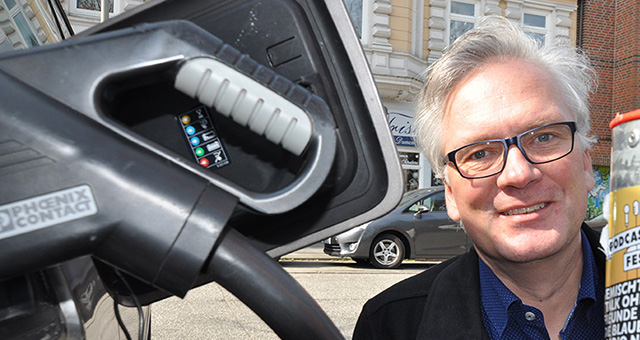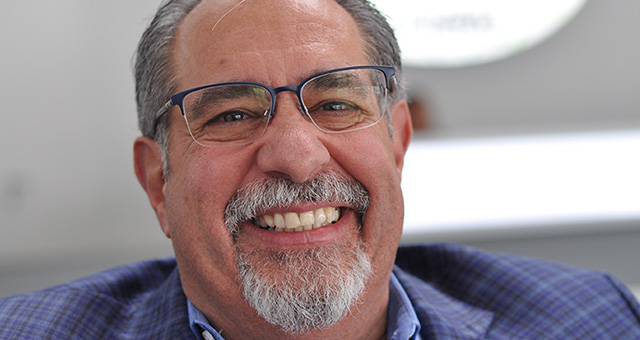And many more than just the eleven a football team needs! In the “it‘s OWL” knowledge cluster, 200 regional companies are working together as a network to be prepared for the challenges of the future. Professor Dr. Roman Dumitrescu reveals in an interview how this knowledge community works, what opportunities it presents, and what obstacles have to be overcome.
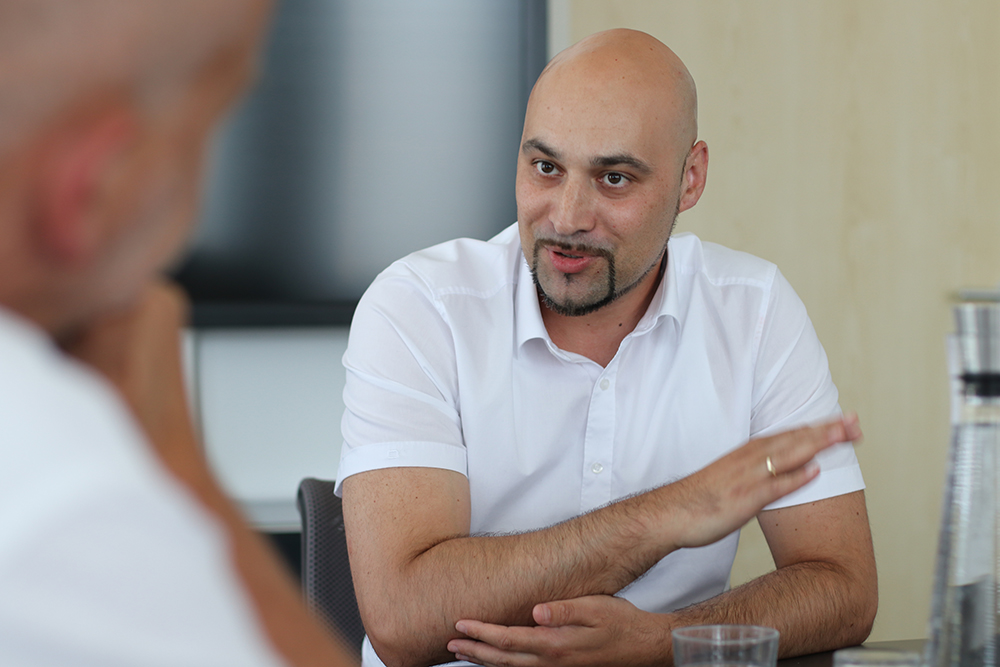
The likeable university lecturer is an experienced expert on topics such as automation, mechatronics, and production. This is hardly surprising, since this postgraduate engineer is one of the directors of the Fraunhofer Institute IEM in Paderborn, Germany, with a focus on mechatronics and product development for intelligent technical systems. Since 2012, he has also been Managing Director of the
“it‘s OWL” knowledge cluster. And since 2016, he has held the chair for Advanced Systems Engineering at the University of Paderborn.
UPDATE: Professor Dumitrescu, what’s behind the term “it‘s OWL”?
In principle, “it‘s OWL” is a technology network consisting of companies from the Ostwestfalen-Lippe region of Germany, shortened to OWL. The network also includes research institutes and universities that are active and conduct research involving intelligent technical systems. This, in turn, is something the companies can make good use of.
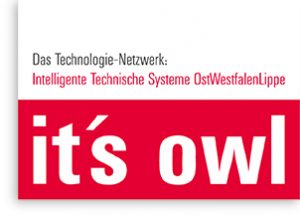
UPDATE: Education and university research and corporate real-world applications — how does it all fit together?
This is exactly what we are bringing together in the cluster to exploit the effects that research and application generate without any great loss of friction. Indeed, it’s often the case that research is carried out from a scientific point of view. Whether it can be applied in practice — that question is not even considered at first. We are trying to change this way of thinking, are trying to instill into our students and researchers the importance of practical applications at an early stage as well. Because real-world applications enrich research enormously.
UPDATE: Why OWL? Are the Eastern Westphalians smarter than the rest of the country? Or are there similar clusters in other regions of Germany?
In 2010, the federal government held a competition. They were looking for clusters or regions that could keep up with Silicon Valley. The only conditions were that the cluster or region should be relevant to Germany, that it should be regionally concentrated, and that it needed to be a top region from a scientific and economic point of view. So we held discussions with all relevant companies, including Phoenix Contact, about where they saw themselves in the next five years, what technical issues they were working on, and whether they could manage that on their own.
UPDATE: What was the general feeling of the companies?
The response was quite clear back then: Products are becoming increasingly more networked, they are becoming more intelligent. And no, they can’t do it on their own anymore. And that was the reason we applied. Some companies — such as Phoenix Contact, Miele, and Claas — were actively involved right from the start. We identified research projects that would benefit everyone. And when we won, we also received funding for these projects. That was five years ago. And we are continuing to work on this.
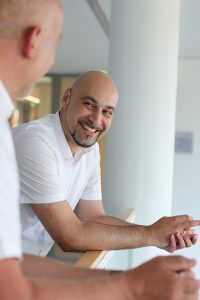
UPDATE: Which industries are playing a role in this knowledge and research community?
Machine building and systems manufacturing first and foremost. Companies that hardly know about anyone outside their sphere of influence, such as paint line manufacturers, packaging plant manufacturers, and production machine manufacturers. Hidden champions. A big advantage of this growing community is that no one is too big. There aren’t any industry giants that dominate everything — these are all medium-sized, family-run companies that think strategically and longterm. This structure is very pronounced, very special. There are also medium-sized centers in other regions, but there are usually very unequally sized stakeholders involved.
UPDATE: What about the former position of Germany as a leading nation of knowledge? Is Germany ready for the future?
There are studies that predict that in 20 years, 98 percent of scientists will come from Asia. But I am certain that Germany will also have very good opportunities in the future. The brand “Made in Germany” is still the number one seal of quality worldwide.
When it comes to digitalization, there is often the feeling that we are behind, because we don’t have the Amazons, the Googles, or the Apples. How do we introduce the new ideas and approaches into our traditional industries? This is exactly what “it‘s OWL” is demonstrating. Here, a region characteri-
zed by medium-sized companies is on its way to becoming a digitalized industry.
UPDATE: OWL does not exactly enjoy metropolitan status, though. How big is this locational disadvantage against the background of demographic change?
If all future specialists only want to work at Amazon or Google, and nobody wants to work for classic companies, like those in Blomberg, anymore, then it’s going to be a problem (smiles).
But I don’t see that happening. Not all the young people only want to go to Berlin…
UPDATE: The topic of family businesses is one of the special characteristics of Eastern Westphalia. Is it a strength or a weakness?
It’s a huge advantage. These companies are not managed based on quarterly figures, but based on long-term strategies. If you have a commitment with the local entrepreneurs, then that’s worth its weight in gold.
In a large number of cases, I have not come across the much criticized fundamental conservative attitude, but rather an entrepreneurial vision and a willingness to courageously face these new digital challenges and dare to try something new. This is against the backdrop of the owners also facing a
generational handoff.
UPDATE: Is there a startup culture here?
Definitely. There always has been. Otherwise the companies wouldn’t exist. The only difference is that the current startup scene enjoys much more attention. There are many hidden champions in OWL. Today’s startups want to do the opposite, because they are fighting for investors. But at the end of
the day, a company should also have added value and be successful. And the local companies have demonstrated this very well. The entrepreneurial objective is not to be fashionable, but to stay on the market.
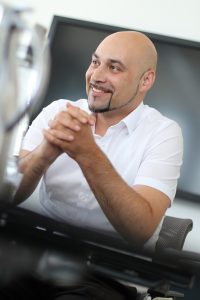
UPDATE: What role does Phoenix Contact play in “it‘s OWL”?
Phoenix Contact was there right from the start. The company is one of 25 core partners that are massively involved. CTO Roland Bent is a member of the Cluster Board, and recently also became Acting Chairman. And Phoenix Contact has been involved in tangible projects right from the start. This makes it one of the most visible companies in “it‘s OWL”.
UPDATE: Many companies involved are actually in strong competition with each other. How does the teamwork work?
It’s been a process for us. Even as recently as 2011, joint projects with direct competitors were almost impossible. While in the beginning the general managers probably only sat together to keep a close eye on each other, trust has built up over the course of the cooperation. The closer companies become in the market, the closer they are in terms of the product, and therefore the more likely
they are to be competitors. However, this will not and should not influence the cluster.
UPDATE: Where will the industry be in ten years?
The digital transformation is essential and defining, but not as rapid as it seems. In OWL, the small to medium-sized enterprises are well-positioned. But they have to join in now. German companies know their processes very well, are good in terms of performance. They are very close to their customers, in particular in terms of the sales departments, and have an immense understanding of the issues. This sales network will be extremely important. Sales and service are a huge source of knowledge in understanding where the customer’s pain points are. If companies succeed in integrating customer knowledge into new services, then we will remain strong.
UPDATE: Can the Eastern Westphalians perform in terms of service?
Yes, we can. And we are actually very good at it. The family-oriented Eastern Westphalian entrepreneurs founded their companies based on the needs of their customers.

